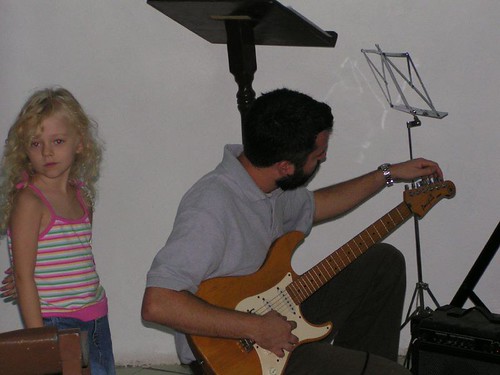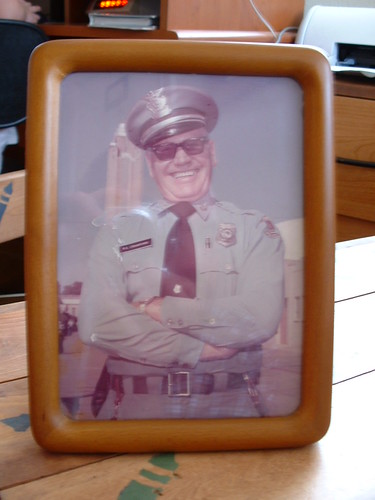I lead worship at our Sunday church services. Other people participate with me, and my goal is to work toward pushing others toward that leadership role, but for now I lead each week. When I say that I lead worship, I mean that in the service I take a leadership role and try to direct the congregation's thoughts and affections Godward, setting the truth before them, with the goal that we would treasure him more than anything else, and that that treasuring would be manifested in our lives as faithful obedience, sacrificial love, and the forsaking of sin in our lives (among other things).
If you think about it, this is a hopelessly impossible task. We're talking about humans here. Each one of us is a sinner, and we're all, as Bill Hybels says, on the downward escalator. During the week we have been bombarded on all sides with the lies of the world--in advertisements, in our entertainment, and in our culture's values in general--preaching to us that we don't need God, that other things will satisfy us more than him, that he doesn't know what's best for us, or what have you. And the thing is, more often than not we believe this message. We buy it, hook, line, and sinker, and we go back to it over and over again, even though God continually proves it wrong. To put it in the prophet Jeremiah's words, "Be appalled, O heavens, at this; be shocked, be utterly desolate, declares the LORD, for my people have committed two evils: they have forsaken me, the fountain of living waters, and hewed out cisterns for themselves, broken cisterns that can hold no water." (
Jeremiah 2:12-13) To put it like Paul does in
Romans 1, we "exchanged the truth about God for a lie and worshiped and served the creature rather than the Creator."
So even though there is nothing in the universe more satisfying than walking with God, not one of us naturally seeks him. I could teach this from a theological standpoint, but for now I'll just say that in my own experience, both from knowing my own heart and from pastoral ministry, this has been evident. And it makes the idea of trying to confront this head-on seem, as I said before, crushingly hopeless. Of course, the Holy Spirit can open hearts and change lives, reveal truth to our minds and put affections in order. But without him we really are hopeless.
Each Sunday morning for the past several months, I have tried to listen to the hymn "
Come, Ye Sinners, Poor and Wretched" both to remind myself of this hopelessness apart from God (lest I fail to hope only in him to actually accomplish something in a worship service) and to remind myself of his promised grace and mercy. Here are the lyrics:
Come, ye sinners, poor and wretched,
Weak and wounded, sick and sore;
Jesus, ready, stands to save you,
Full of pity, joined with power.
He is able, He is able;
He is willing; doubt no more.
Come ye needy, come, and welcome,
God's free bounty glorify;
True belief and true repentance,
Every grace that brings you nigh.
Without money, without money
Come to Jesus Christ and buy.
Come, ye weary, heavy laden,
Bruised and broken by the fall;
If you tarry 'til you're better,
You will never come at all.
Not the righteous, not the righteous;
Sinners Jesus came to call.
Let not conscience make you linger,
Nor of fitness fondly dream;
All the fitness He requireth
Is to feel your need of Him.
This He gives you, this He gives you,
'Tis the Spirit's rising beam.
Lo! The Incarnate God, ascended;
Pleads the merit of His blood.
Venture on Him; venture wholly,
Let no other trust intrude.
None but Jesus, none but Jesus
Can do helpless sinners good.
There was a time when I used to think this sort of lyric would be applicable only to the unconverted, and that believers didn't need to hear this; but now I know
I need, as all believers do, to be confronted with these truths constantly. I have never found a Spanish version of this hymn, so if anyone knows of one, let me know. If I was leading worship somewhere regularly in English, I might very well start off every service with this song (at least until everyone got hacked off about it and I got in trouble).
By the way, there is a tampered-with version of this hymn that became popular during the Second Great Awakening that cuts off the last two lines of each verse (some of the most pointed lines) and adds a sappy chorus. This was obviously done to make it more friendly to the revivalist theology of the day, but it changes the meaning of the song completely. You can buy the good version on iTunes from Matthew Smith's album,
Even When My Heart Is Breaking.








